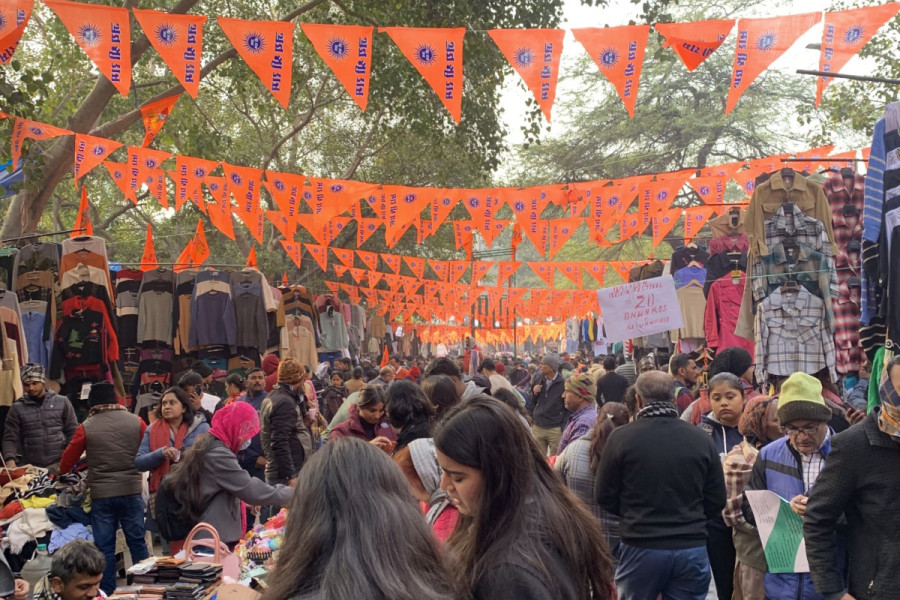Columns
Raisina, Ram and Nepal
Nepali politicians old and new are competing to pay homage to the BJP’s brand of religious politics.
Biswas Baral
With a touch of nip still in the air, New Delhi had just about the perfect weather to welcome over 3,000 delegates to the three-day Raisina Dialogue (February 21-23). Another couple of weeks, and the Taj Palace Hotel lawns could have been boiling hot.
Hosted by the Observer Research Foundation in partnership with the Ministry of External Affairs, “India’s premier conference on geopolitics and geoeconomics” has come to symbolise the country’s rising global clout and the soaring ambitions of its leaders.
Currently growing at 7.5 percent, India under Modi is increasingly confident of its place in the world. Gone are the days when Westerners could lecture it on human rights and its leaders would feign to listen while seething inside. Now any hints that the West holds any moral or ethical superiority over the East are quickly shot down.
The laid-back, straight-talking foreign minister of India, Subrahmanyam Jaishankar, is the epitome of this new India. These days, the author of Why Bharat Matters sounds more like a hard-nosed businessman than a seasoned diplomat as he bats for ‘plurilateralism’, essentially a world driven by self-interest rather than idealism. This was on ample display in the multiple sessions he took part in at Raisina Dialogue.
In his new book, he makes a strong case for Bharat, as Hindus traditionally refer to India, as a civilisational state. He questions the Western academia for its poor knowledge, for instance how its analysis of India makes little or no mention of the Mahabharata, even though the book is central to Indian strategic thought. In fact, Why Bharat Matters is packed with allusions that India united under a single religion is best placed to deal with the rest of the world.
This pet project of Narendra Modi is nearly complete. As is the case in most of north India, the signs of saffronisation are there to be seen everywhere in the Indian capital.
Pennants of ‘Jai Shree Ram’ are tied to the tempos you take, the markets you visit, people’s homes, everywhere. An Indian journalist recounted how during the inauguration of Ayodhya Temple last month, the BJP foot-soldiers had pinned such pennants to all the houses in his neighbourhood—and you removed them at your peril.
This pitch of Hindu nationalism will get louder in the lead-up to the April-May Indian national elections. The NDA alliance the BJP heads is expected to get a clear majority, with the latest polls giving it over 370 seats in the 543-member lower house. It will be a super-majority forged and festooned around the new Ram Temple in Ayodhya.
You casually bring up the dangers of Hindu nationalism with Indian diplomats, not just for India but also for Nepal that for the first time in its history is witnessing religious strife, and your concerns are greeted with stony silence. The message is that this is a reality we must now all live with.
Perhaps this is also why Nepali politicians old and new are competing to pay homage to the BJP’s brand of religious politics. Nepali Congress and CPN-UML leaders tell their Indian interlocutors that they are firmly in favour of a Hindu Nepal. While he is more equivocal on ‘Nepal as a Hindu state’ agenda, Maoist Centre chairman and Prime Minister Pushpa Kamal Dahal is also comfortable putting on saffron robes any occasion he gets.
Even top Rastriya Swatantra Party heads have been making the rounds of New Delhi, trying to convince Indian leadership that compared to the old and discredited NC and UML lots, they are more credible forces for the protection of the Hindu faith this side of the border.
The Indians were livid when the RSP chief Rabi Lamichhane called out Narendra Modi from the street last year, asking the Indian prime minister to talk to him rather than engage those who claim to be India’s friends but are actually its foes. Lamichhane has since been apologetic and making every effort to woo the Indians, as he too seems to realise that the path to Singha Durbar runs through New Delhi.
Another thing Nepali leaders visiting the Indian capital have had to do of late is swear to stay away from China. The Indian establishment has intimated to its neighbours that they will increasingly have to choose between India and China. New Delhi, for one, has no truck with Nepal’s policy of ‘balancing’ its two big neighbours when Nepal gets most of its benefits from India.
Top Indian government officials who spoke at the conference and its sidelines used words like ‘bully’ to describe China. As they sipped on fragrant Kashmiri tea served inside the sumptuous subterranean halls of Taj Palace, one clear message they gave was that unless the Sino-India border is first settled, there will be no improvement in India-China ties—the implication for smaller regional states like Nepal being that India will want them to keep a safe distance from Beijing.
But in the larger Indian foreign policy thinking, the neighbourhood is less and less of a priority, despite all the hoo-ha about ‘neighbourhood first’. All the talk in New Delhi these days is about India’s membership of the UN Security Council, calibration of New Delhi’s ties with Moscow and matching China step for step.
What you also get to hear consistently from Nepal watchers in New Delhi is the high level of comfort New Delhi has with the Pushpa Kamal Dahal government. In their telling, India will do what it can to ensure that it remains firmly in place.
On the part of Nepali government officials and diplomats, they seem clear enough that India offers Nepal the clearest path to prosperity, most notably through the use of its excess energy. “Let’s be realistic about who is and who is not in a place to buy the huge amount of our surplus electricity,” as one Nepali diplomat who was in New Delhi in connection with the Raisina Dialogue put it. If this entails keeping the Chinese out of Nepal’s power sector, that is a price worth paying.
Modi and his BJP enforcers want absolute fealty—and they are getting it from Kathmandu. Neither side seems too bothered about its long-term consequences.




 8.79°C Kathmandu
8.79°C Kathmandu















